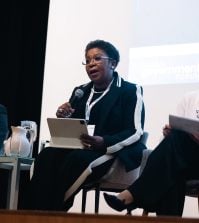Nigerian president orders procurement officials to favour domestic firms

Nigeria’s president Muhammadu Buhari has signed an Executive Order requiring public bodies to give preference to Nigerian companies when awarding procurement contracts.
Executive Order 5, issued earlier this month with immediate effect, also requires the Ministry of the Interior to stop issuing visas to foreign workers whose skills are readily available in Nigeria.
Announcing the order, the president’s press secretary Garba Shehu said it aims to promote Nigeria’s development goals across all sections of the economy.
“The president, pursuant to the authority vested in him by the constitution, ordered that all procuring authorities shall give preference to Nigerian companies and firms in the award of contracts, in line with the Public Procurement Act 2007,” he said.
Capacity-building
Where expertise is lacking, government ministries, departments and agencies (MDAs) “shall give preference to foreign companies or firms with demonstrable and verifiable plans for indigenous capacity development” before a contract is awarded, the order states.
For national security projects, officials can only consider contracting a foreign professional to carry out the planning, design or execution of work where it has been “certified by the appropriate authority” that such expertise is not available in Nigeria.
For consultancy services involving joint venture relationships and agreements with foreign companies, officials must ensure that a registered Nigerian company is the lead partner and that Nigerian counterpart staff are engaged from the conception stage to the end of the project. Engineering drawings and calculations must be made available to the Nigerian partner.
Registration requirements

Muhammadu Buhari, president of Nigeria (Image courtesy: Chatham House).
The order also specifies additional registration requirements to back up the new regulations. Any joint venture or public private partnership involving both a foreign company and a Nigerian one must be registered with the National Office for Technology Acquisition and Promotion (NOTAP) before a procurement contract is signed.
The head of the civil service and MDA officials must ensure that any professional certificates awarded abroad are “domesticated” with the relevant professional bodies in Nigeria before the contractor or employee is considered for a contract.
And invitations to tender and other procurement documents issued by officials must expressly indicate that preference is granted to domestic manufacturers, contractors, suppliers and service providers, as well as obliging bidders to provide a “verifiable statement” on the local content of goods and services to be provided.
Welcomed by labour movement
Joe Ajaero, president of Nigeria’s United Labour Congress, commended president Buhari for the “laudable” move and called on him to ensure compliance with the order, if necessary by setting up a tripartite body to monitor compliance, the Vanguard newspaper reported.

Women train as aircraft engineers at the International Aviation College in Kwara State, Nigeria (Image courtesy: Eyibeauty Oyelowo).
“ULC is excited that an Executive Order has been signed to stop the haemorrhaging of our jobs and its attendant loss in tax and various economic multipliers,” he said, adding that Nigeria’s 75% youth unemployment rate is rooted in the dwindling capacity of local businesses to create jobs.
Fabian Aluka, CEO of ITNigeriaHub, called for a monitoring and enforcement team to be set up so the order could not be flouted, as reported by www.AllAfrica.com. Stiff sanctions should be meted out to public bodies and private companies that violate it, he added.
However, procurement expert Peter Smith has previously warned that tightening Nigeria’s procurement rules to favour local businesses runs the risk of driving up costs, reducing quality and fostering corruption. Such policies are, he wrote on www.spendmatters.com, “a form of economic protectionism, which has been shown over many years and many examples not to work.”





















